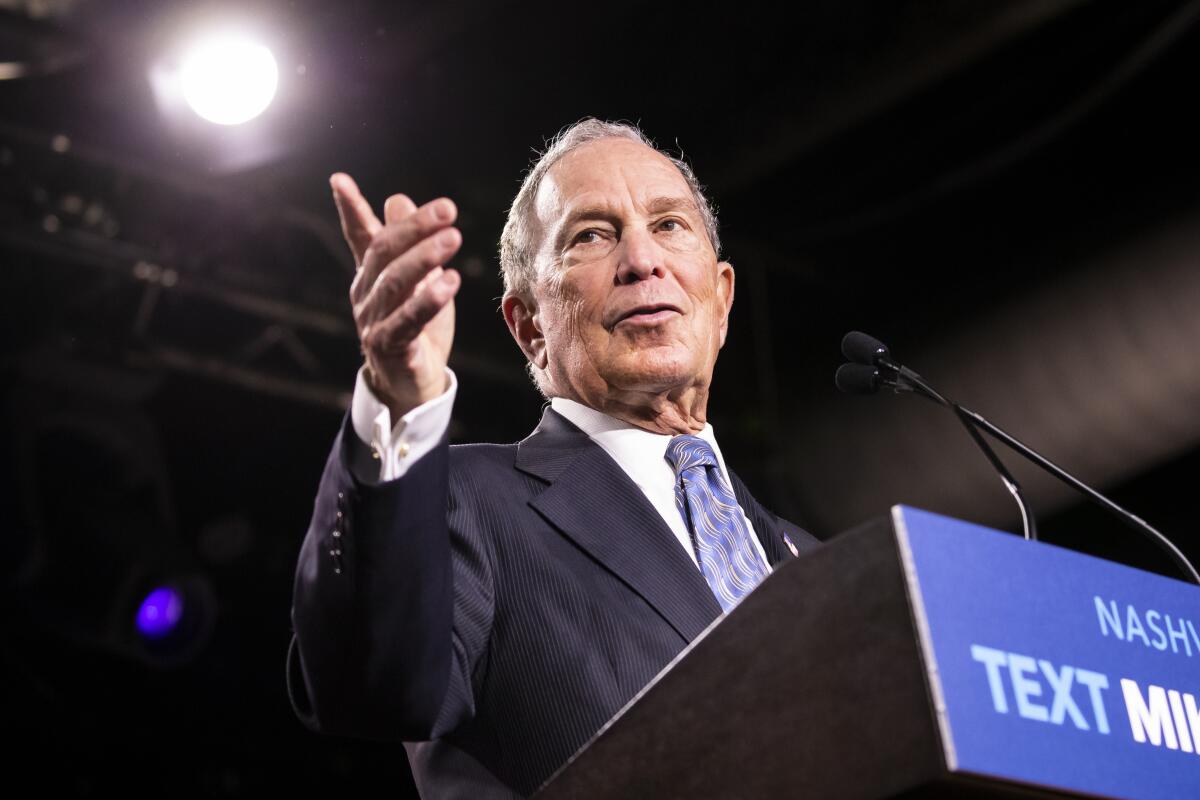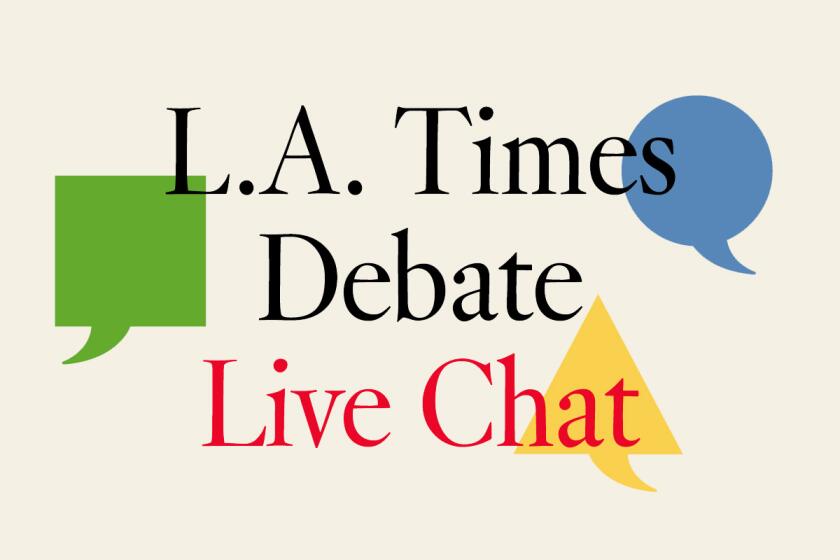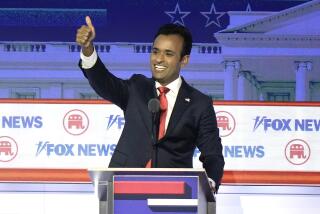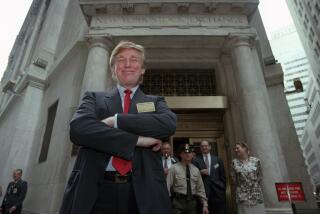Column: Look for the target on Bloomberg’s back tonight

The Democratic presidential candidates’ debate in Las Vegas tonight may be most remembered as the debut of their newest contestant, former New York Mayor Michael R. Bloomberg.
For many voters, this will be their first look at the candidate who has spent an astronomical $330 million so far, but has yet to face off directly against other Democrats. Look for the giant target on his back.
And watch to see if he has turned himself into a New Bloomberg, a Democrat who can attract support from across his divided party.
The Old Bloomberg was an unapologetic champion of capitalism, which made him and others in New York City very wealthy.
“Inequality is a very big problem,” he acknowledged in 2018. “But the bigger problem is you can take money from the rich…. If you do it too much, then the rich stop producing and everybody loses.”
Billionaire former New York Mayor Michael Bloomberg faced attacks by other Democratic presidential candidates on the debate stage in Las Vegas on Wednesday night. Former Vice President Joe Biden, former South Bend, Ind., Mayor Pete Buttigieg, and Sens. Amy Klobuchar, Bernie Sanders and Elizabeth Warren also turned their fire on each other. The candidates sparred over healthcare, experience, sexism and transparency.
The New Bloomberg still likes capitalism, but he’s no longer as worried about the feelings of the upper crust. Since he began running, he’s proposed a long list of tax increases, including a surtax on anyone who makes more than $5 million a year.
“The rewards of the economy are far too concentrated at the top,” he wrote after he announced his campaign in November.
The Old Bloomberg promoted “stop and frisk,” the aggressive police tactic that targeted young minority men but produced relatively few arrests. A judge ruled the policy unconstitutional, but the former mayor defended it as recently as last year.
Nine months later, the New Bloomberg began his presidential campaign with an uncharacteristic apology: “I was wrong,” he said in a speech at an African American megachurch in Brooklyn. “And I am sorry.”
Before joining the race, the Old Bloomberg mocked Democrats who believed they needed to apologize for their past records. “Joe Biden went out and apologized for being male, over 50, white,” he said.
That was one reason he initially decided not to run, Bloomberg said; he knew he couldn’t win “unless I was willing to change all my views and go on what CNN called an apology tour.”
He’s been on that tour ever since.
The New Bloomberg hasn’t reinvented himself as a progressive in the mold of Bernie Sanders or Elizabeth Warren. He’s working to position himself squarely in the Democrats’ moderate-to-liberal mainstream.
In recent weeks, his campaign has issued a blizzard of policy statements that have made him sound pretty much like Biden or Amy Klobuchar.
The Old Bloomberg was a scornful critic of Sanders’ “Medicare for All” and other government-run health insurance. The New Bloomberg has offered a proposal that includes a government-run public option, intended only to compete with private insurance plans, not replace them.
The Old Bloomberg once blamed the 2008 financial crash on Congress, which he said “forced everybody to go and give mortgages to people who were on the cusp” of creditworthiness.
The New Bloomberg blamed the crash on “irresponsible banking practices” and proposed a new program to make it easier for moderate-income families to qualify for mortgages.
Perhaps most striking, on Tuesday the New Bloomberg unveiled a proposal for regulating Wall Street that would encourage prosecutors to pursue corporate executives as well as their companies, and toughen the bank regulations known as the Volcker Rule.
The Old Bloomberg criticized the Volcker Rule, which barred banks from making risky trades for themselves rather than clients.
The new proposal would also impose a tax on financial transactions — an idea that has also been endorsed by Sanders, Warren and left-wing icon Rep. Alexandria Ocasio-Cortez (D-N.Y.).
“The financial system isn’t working the way it should for most Americans,” Bloomberg said, sounding a lot like Sanders. “The stock market is at an all-time high, but almost all of the gains are going to a small number of people.”
The former Salomon Brothers bond trader still opposes the wealth tax that Sanders and Warren want to enact. But at least he has a comeback if one of them accuses him of being too close to Wall Street.
Bloomberg is likely to use those lines tonight. Other candidates, alarmed by his advertising-fueled rise in the polls, are spoiling for a fight.
He’s trying to build a case that, even though he won two mayoral elections in New York as a Republican, he’s just another mainstream Democrat now — not only on gun control and climate change, where he has long held progressive views, but on core economic issues as well.
But the policy details will probably be less important than a more elusive question: who can beat President Trump? That’s what most Democratic voters say they’re looking for this year — not a list of ideological litmus tests.
It’s the argument that Bloomberg has worked relentlessly to sell: that he — not the sometimes-stumbling Biden, the untested Klobuchar or the underexperienced Pete Buttigieg — is best positioned to win back the White House.
Bill Clinton used to invoke an old political adage: Democrats want to fall in love with a candidate; Republicans are happy to fall in line.
Bloomberg seems intent on disproving that rule. His pitch is more practical: that he has the money, the toughness and broad enough appeal to beat the president.
All he has to do is persuade his fellow Democrats to forget the old Bloomberg and embrace — or at least accept — the new one.
More to Read
Get the L.A. Times Politics newsletter
Deeply reported insights into legislation, politics and policy from Sacramento, Washington and beyond. In your inbox three times per week.
You may occasionally receive promotional content from the Los Angeles Times.








